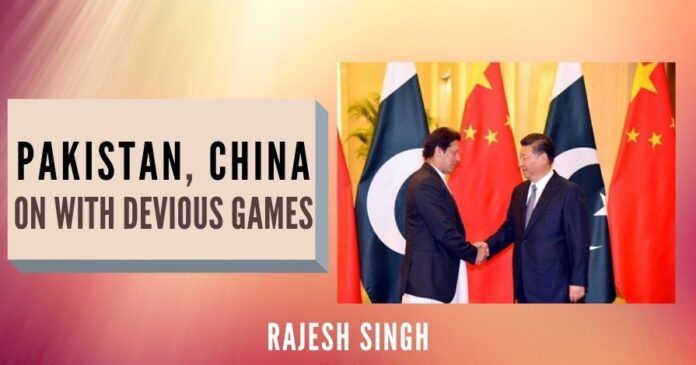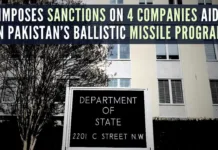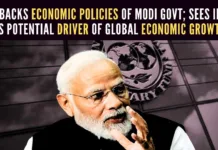
Questions have been raised on the behaviour of China and Pakistan — all-weather friends.
While the world is focussed on combating the Coronavirus pandemic which has claimed several thousands of lives, two countries are busy with their parochial and often devious agendas. They are China and Pakistan. Both seem to be exploiting the situation to further their respective interests. While Beijing is using the occasion to push its hegemonist designs in its neighbourhood, Pakistan, from media accounts, has stepped up its campaign to create unrest in Kashmir through renewed terror attacks by its proxies.
Under direct attack from most of the Western nations and muted criticism from several others over its handling of the pandemic, the Chinese government and the Communist Party of China have resorted to brazen offensives to discredit its critics. They have, in this endeavour, the support of a few global agencies such as the World Health Organisation (WHO) and various experts spread across the globe. In addition to targeting the Trump administration which has been at the forefront of demanding explanations from Beijing, it is seeking to bully others such as Australia, Germany and France. It has launched a massive misinformation campaign globally to turn the tables on the US, claiming that President Donald Trump is seeking to divert attention from his administration’s failures in containing the disease by targeting China. There may be some truth in the allegation that the Trump administration’s response to the pandemic has been far from satisfactory, but the truth also is that the virus came from China and spread across the world.
The recent elimination of Pakistan-based Hizbul Mujahideen’s Kashmir chief Riyaz Naikoo by Indian security forces has rattled the neighbouring country.
On another front, China is using the opportunity to push for its dominance in the region, especially the South China Sea and even beyond. It has, for instance, announced new administrative districts in the contested Spratly and Parcel archipelagos. It has also named some 80 islands in the region, cocking a snook at claims by the Philippines and Vietnam. Only last month, the People’s Liberation Army of China conducted marine exercises in the South China Sea. Neither the Philippines nor Vietnam could do much against these incursions, beyond registering diplomatic protests. Closer home, it engaged in a confrontation with Indian troops along the Sikkim border, resulting in injuries to nearly a dozen soldiers from both sides. The face-off happened near the Naku La sector in Sikkim.
The Indonesian government has already expressed its concern over the incidents in the South China Sea and berated Beijing for indulging in precipitate action at a time when the world was busy combating the pandemic. One of China’s aircraft carriers sailed close to Taiwan while its aircraft breached Taiwan’s airspace. Elsewhere, South Korea scrambled its fighter jets after a Chinese surveillance aircraft entered the Korean airspace without prior information. From China’s actions, it is evident that the Communist Party of China and the government in Beijing is viewing the current situations as being ideal to promote its dominating mindset.
The conduct of Pakistan has been no better. In the first place, its leadership has sought to downplay the impact of the pandemic in the country. According to some reports, there are more than 5,000 cases across the country, but the Imran Khan government is clueless on how to tackle the menace. Although there has been a graded lockdown in some parts, Pakistan’s economy is in such doldrums that it cannot afford to remain locked down for long, even if the lifting means loss of several thousand lives. Many of the Coronavirus cases have been reported from Gilgit-Baltistan, Pakistan-Occupied Kashmir and Khyber Pakhtunkhwa. Incidentally, these regions have been traditionally given step-motherly treatment by successive Pakistani regimes — with the Imran Khan government being no exception. But the Pakistani authorities have sought to place a lid on the dangerous impact of the pandemic.
Instead, they are busy fomenting trouble in India, particularly in Jammu & Kashmir. In recent weeks, Indian security forces have gunned down several terrorists in Kashmir valley. Some of these were local stooges of Pakistan while others were infiltrators. The militants belonged to terror groups based in Pakistan. They have been patronised by official Pakistani agencies such as the Inter-Services Intelligence (ISI). The recent elimination of Pakistan-based Hizbul Mujahideen’s Kashmir chief Riyaz Naikoo by Indian security forces has rattled the neighbouring country. Perhaps Pakistan believes that India, occupied with tackling COVID-19, would be easier to target. But it ought to at least now be disabused of this notion.
Instead of concentrating on the pandemic, the Pakistani Prime Minister is engaged in his old game of blaming India for acts that have not been committed. For instance, he has accused India of planning to launch a “false flag operation” to target Pakistan. He said that India would use the pretext of infiltration from the Pakistani side to justify the attack. It is obvious that Imran Khan is an insecure man and is terribly frightened of India’s potential to launch anti-terror attacks. This insecurity had grown especially after India conducted surgical strikes in Pakistani territory and in PoK in recent months.
India’s initiative in tackling the pandemic has been in sharp contrast to that of both China and Pakistan. It has been transparent in its approach, it has worked closely with the global community to handle the crisis, and its actions have been widely appreciated by world leaders. It’s no wonder, therefore, that the Indian leadership has come in for all-round praise internationally while questions have been raised on the behaviour of China and Pakistan — all-weather friends.
Note:
1. The views expressed here are those of the author and do not necessarily represent or reflect the views of PGurus.











[…] Source […]
[…] Source link […]